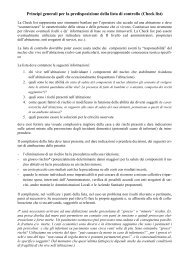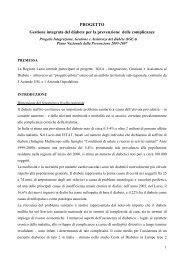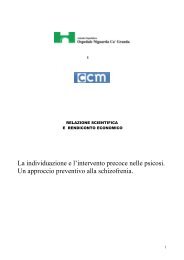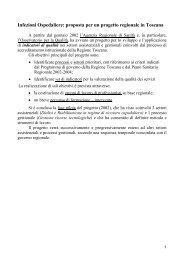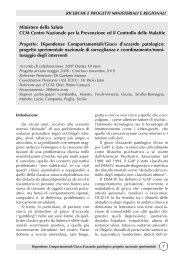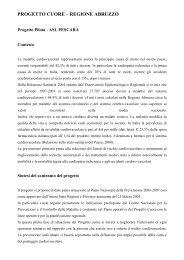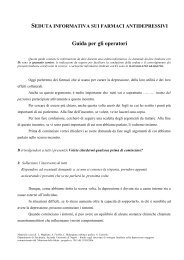Gaining health : analysis of policy development in European ...
Gaining health : analysis of policy development in European ...
Gaining health : analysis of policy development in European ...
You also want an ePaper? Increase the reach of your titles
YUMPU automatically turns print PDFs into web optimized ePapers that Google loves.
5.4. Susta<strong>in</strong><strong>in</strong>g <strong>policy</strong> implementation, monitor<strong>in</strong>g<br />
and revision<br />
The means for monitor<strong>in</strong>g and evaluat<strong>in</strong>g epidemiological<br />
trends are considered from the <strong>in</strong>itial stages <strong>of</strong> <strong>policy</strong>mak<strong>in</strong>g.<br />
Less attention has been given to a more qualitative<br />
<strong>analysis</strong>, <strong>in</strong>clud<strong>in</strong>g the process <strong>of</strong> <strong>policy</strong> <strong>development</strong>, or<br />
the effectiveness <strong>of</strong> specific <strong>in</strong>terventions. Interest<strong>in</strong>gly, the<br />
monitor<strong>in</strong>g and evaluation process is said to have caused<br />
some disillusionment, as it has become clear that certa<strong>in</strong><br />
parts <strong>of</strong> the <strong>health</strong> programme are not be<strong>in</strong>g implemented<br />
as planned.<br />
The sound evidence base already achieved, the provisions<br />
for ongo<strong>in</strong>g and regular surveillance <strong>of</strong> <strong>health</strong> status and behaviour,<br />
and the transparent processes <strong>in</strong> place for report<strong>in</strong>g<br />
back and mak<strong>in</strong>g <strong>in</strong>formation accessible should ensure<br />
that NCD rema<strong>in</strong> on the <strong>policy</strong> agenda <strong>in</strong> Lithuania, with or<br />
without the present key movers. Lithuania is <strong>in</strong> the fortunate<br />
position, therefore, <strong>of</strong> be<strong>in</strong>g able to further f<strong>in</strong>e-tune<br />
the knowledge base for NCD <strong>policy</strong> <strong>development</strong>, <strong>in</strong>clud<strong>in</strong>g<br />
for example:<br />
• a sharper focus on possible <strong>in</strong>equalities, <strong>in</strong>clud<strong>in</strong>g gender<br />
differences and the particular issues fac<strong>in</strong>g the rural<br />
population <strong>in</strong> relation to access to <strong>health</strong> promotion and<br />
NCD services;<br />
• further <strong>development</strong> <strong>of</strong> the methodology for HIA and<br />
the creation <strong>of</strong> a legal or regulatory framework for its<br />
implementation;<br />
• evaluation <strong>of</strong> the effectiveness <strong>of</strong> <strong>in</strong>terventions to tackle<br />
NCD;<br />
• assessment <strong>of</strong> the accessibility <strong>of</strong> <strong>in</strong>formation at local<br />
level and for lay people;<br />
• methods for improved participation <strong>in</strong> <strong>policy</strong> <strong>development</strong>;<br />
and<br />
• evaluation <strong>of</strong> the operation <strong>of</strong> structures for <strong>in</strong>tersectoral<br />
action.<br />
Numerous NGOs are be<strong>in</strong>g created and are attempt<strong>in</strong>g to<br />
strengthen their impact on NCD <strong>policy</strong> through jo<strong>in</strong>t action.<br />
An evaluation <strong>of</strong> the channels <strong>of</strong> communication open<br />
to NGOs and their capacities for effective action could<br />
perhaps strengthen the voice <strong>of</strong> civil society. Given the high<br />
level <strong>of</strong> education <strong>of</strong> the population, the use <strong>of</strong> modern<br />
communications technology holds considerable potential.<br />
For NCD <strong>policy</strong> <strong>development</strong> to become a reality, three<br />
<strong>policy</strong> streams need to converge: awareness <strong>of</strong> the problem;<br />
a facilitat<strong>in</strong>g <strong>policy</strong> environment; and the means for<br />
<strong>policy</strong> <strong>development</strong>. In the case <strong>of</strong> Lithuania, all three are<br />
strongly evident.<br />
In summary, five ma<strong>in</strong> factors seem to have dom<strong>in</strong>ated the<br />
process:<br />
• political changes creat<strong>in</strong>g a facilitat<strong>in</strong>g environment;<br />
• the decisive and persistent role <strong>of</strong> key experts and<br />
politicians;<br />
• the unique role <strong>of</strong> Parliament and the degree <strong>of</strong> crossparty<br />
collaboration;<br />
• long and cont<strong>in</strong>ued participation <strong>in</strong> <strong>in</strong>ternational networks,<br />
particularly the CINDI project, and the support<br />
when needed <strong>of</strong> WHO and other <strong>in</strong>ternational organizations;<br />
and<br />
• the availability <strong>of</strong> a sound evidence base at the beg<strong>in</strong>n<strong>in</strong>g<br />
<strong>of</strong> the process and its cont<strong>in</strong>ued improvement, with<br />
regular surveys, formal public <strong>health</strong> reports and a transparent<br />
monitor<strong>in</strong>g process l<strong>in</strong>ked to quantified targets.<br />
6. References<br />
1. Highlights on Health <strong>in</strong> Lithuania 2005. Copenhagen,<br />
WHO Regional Office for Europe, 2006 (http://www.<br />
euro.who.<strong>in</strong>t/document/e88740.pdf, accessed 9 June<br />
2009).<br />
Chapter 4<br />
211<br />
Case studies: <strong>policy</strong> <strong>development</strong> <strong>in</strong> countries for tackl<strong>in</strong>g noncommunicable diseases



